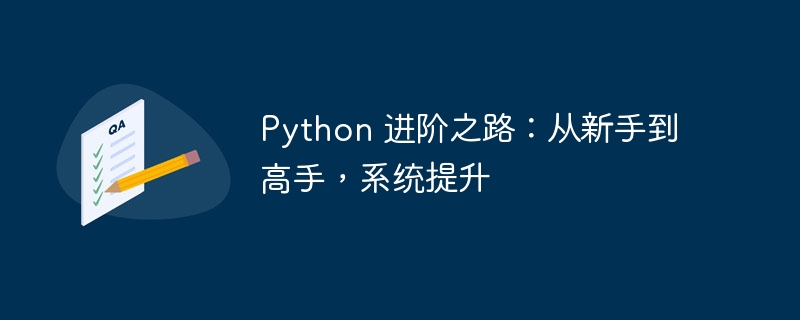

python is a powerful programming language with a wide range of application scenarios. If you have mastered the basics of Python, then now is the time to start advanced learning. This article will introduce a roadmap for advanced learning of Python to help you go from novice to expert and systematically improve your Pythonprogramming abilities.
1. Python data structure
PythonData structure is the basis of Python programming, including lists, tuples, dictionaries, sets, etc. You need to master the use of these data structures and be able to flexibly apply them to solve programming problems.
# 列表
my_list = [1, 2, 3]
# 元组
my_tuple = (1, 2, 3)
# 字典
my_dict = {"a": 1, "b": 2, "c": 3}
# 集合
my_set = {1, 2, 3}2. Python function
Python functions are an important part of Python programming. They can organize code into reusable modules and improve code readability and maintainability. You need to master the knowledge of function definition, calling, parameter passing, etc.
def my_function(a, b): return a + b result = my_function(1, 2) print(result)
3. Python object-oriented programming
Python supports Object-oriented programming, which is a programming paradigm that organizes data and behavior into objects. You need to master the basic concepts of object-oriented programming, including classes, objects, inheritance, polymorphism, etc.
class MyClass: def __init__(self, a, b): self.a = a self.b = b def add(self): return self.a + self.b my_object = MyClass(1, 2) result = my_object.add() print(result)
4. Python modules and packages
Python modules and packages can organize code into reusable units, improving code readability and maintainability. You need to know how to use modules and packages, and be able to create your own modules and packages.
import math result = math.sqrt(9) print(result)
5. Python exception handling
Python exception handling mechanism can capture and handle exceptions that occur when the program is running, improving the robustness and stability of the program. You need to master the basic concepts of exception handling, including try/except/finally statements, etc.
try:
result = 1 / 0
except ZeroDivisionError:
print("除数不能为零")
finally:
print("程序结束")Conclusion
The above is the detailed content of The road to Python advancement: from novice to expert, system improvement. For more information, please follow other related articles on the PHP Chinese website!




